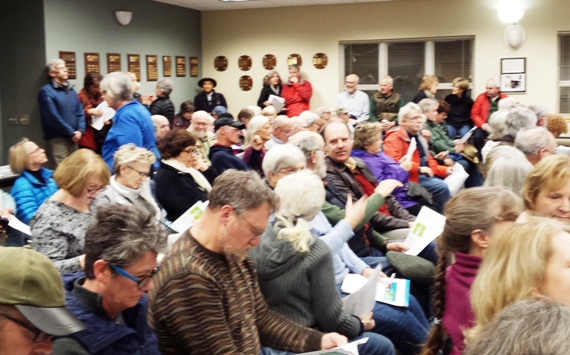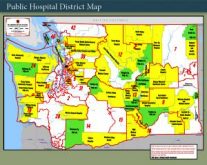— by Margie Doyle —

Islanders flock to hear a presentation on possible financial impacts of a Public Hospital District at a Town Hall sponsored by the Coalition for Orcas Health Care (COHC)
Leading the search for the grail of sustainable primary and emergency healthcare on the island, the Coalition for Orcas Health Care (COHC) sponsored a Town Hall on Jan. 24 that packed the Eastsound Fire Hall.
COHC members Patty Miller and Richard Fralick walked the attendees through a slide presentation that is available on the organization’s website CoalitionforOrcasHealthCare.com “Investing in the Health of our Community.” The Town Hall’s purpose was to “better understand the investment for a sustainable model going forward,” as the community faces an April vote on establishing a public hospital district (PHD) to finance such a model; a second element of that vote is electing five commissioners to serve on a PHD board.
Those who wish to file as a board candidate in the election can do so now online, https://theorcasonian.com/candidate-filing-week-proposed-orcas-island-hospital-district/ Filing closes on Feb. 9, 2018.
The COHC will hold two more meetings in the next months to present the commissioner candidates who have come forward. Again it is important to note that the April ballot will have two measures:
One asking if voters approve forming a public hospital district (there are 58 Public Hospital districts in the state); the second measure will be voting upon candidates for five PHD commissioners. If the first measure fails, then the commissioner decision is moot.
Fralick and Miller spoke on the financial model based on current practices and level of service. They acknowledged the expertise informing their presentation from the COHC Finance Committee (Joe Cohen, Richard Fralick, Pegi Groundwater, Art Lange and Patty Miller); from Orcas Island Medical Foundation Treasurer Kevin Wahlstrom; and from County officials — Rick Hughes, Milene Henley, John Kulseth; from State Senator Kevin Ranker, and from Diane Locke of the state property tax division.
The presenters emphasized several times throughout the presentation that their financial model is based on current practices and levels of service; and that If a Public Hospital District (PHD) is not established by the voters to pay for island medical services, the current practices will go.
Patty Miller and Fralick outlined the main topics of the evening’s presentation:
Approach taken: to consult with best available resources, including the existing practices, UW Orcas Clinic and Orcas Family Health Center (OFHC); and with the Orcas Medical Foundation and Associated Washington Public Hospital Districts (AWPHD).
Lessons Learned:
- Costs might vary year to year, sometimes greatly i.e. upfront election costs, legal costs; bldg and equipment needs;
- The timing between when clinics need assistance and when levy funds are available has significant impact on initial levy rates
Property Tax rules:
- If Orcas voters authorize a PHD this April, the tax funds would become available in 2019
- The maximum PHD tax rate is 75 cents per thousand dollars
- The PHD commissioners would set the rate in November 2018 when the county budget for the following year (2019) is finalized
- Tax amount is limited to 1% increase over current rate, plus new constructions, per the restraints of state law, proposition 747
- The Orcas PHD would have the ability to set a lower rate on one year and set a higher rate following year.
Timeline:
- The Orcas Public Hospital District would be established in April 2018 if the voters approve; tax collection would take place in April-May of 2019 and again in October 2019.
- The District’s support of Orcas practices required in October 2018 to be submitted in November 2018 for county tax assessments; a long term loan for the period before tax collections take place will “tide the practices over” until revenues from tax collection are available.
Assumptions made – ( Miller and Fralick noted that these assumptions are for the purpose of the presentation, and that elected commissioners may make different assumptions)
- The Orcas PHD would fund the two existing primary health clinics at existing levels, assuming the clinics are NOT relying on donated salaries. Funding would include appropriate building and equipment maintenance.
- A short-term line of credit would be established in May 2018
- The first payment to the clinics would be made in Oct. 2018
- Long term (10 year) financing for debt would be acquired to consolidate all expenses from inception of the PHD through Dec. 2018
- PHD administrative expenses are modeled after the Lopez PHD formation with modifications
Investment required
- The Initial investment to establish PHD is estimated at $88,500 and includes items such as election expenses, commissioners’ compensation ($12,000), legal, accounting and professional fees, technology and communication, office, utilities, equipment and furniture, travel and training.
- Fralick said it is a “simple straightforward number to meet [the revenues needed for ]current practices; it would be about 50 cents per thousand dollar property valuation.” However, islanders must also consider how to get through the period (until Spring 2019 when tax revenues are collected, and how “to take those [current] costs and build into a sustainable model.
- Because at first there’d be no money coming in, the PHD would need to acquire using a line of credit. It’s been assumed that OFHC would receive about $330,000 and UW Orcas Clinic would receive about $500,000. There would also be the ongoing expense of $140,000 for PHD administrative costs and $40,000 allotted to the Orcas Medical Foundation, which owns and maintains the UW Orcas Clinic.
- Fralick explained, “During the pre-funded period, look at the expenses; you’re gradually building up your debt. When the first taxes are collected in April 2019, the PHD expenses will be converted into a long term loan, which we be part of the ongoing budgeted expenses of the public hospital district.”
- PHD Commissioners may choose a different model than the one serving in this model, at 3.5% and amortizing over 10 years, Fralick said. They may choose more services, a lower interest rate, or to pay off the loan quicker.”That is why the choice of commissioner is very important, they will have discretion and they need to be the right people, they make important decisions.”
What it means to you The model gave three examples of home values, ranging from $200,000 to $800,000 and three examples of rates, ranging from 55 cents per thousand to the 75-cent maximum allowable tax rate. Barbara Ehrmantraut did some quick calculations and said that a property evaluated at $200,000 would be charged $25/month for the PHD; while a property evaluated at $800,000 would be charged $66/month.
To view the full presentation:TownHall_012418_Investing in a PHD
QUESTIONS
Questions from the audience brought out the following information:
- It will be the commissioners’ decision which health services to fund within the PHD budget
- There is no data yet on the number of persons currently accommodated at the UW Orcas Clinic
- The Orcas Medical Foundation non-profit is included in the budget model estimate ($40,000) because it is responsible for the costs of maintaining the UW Orcas Clinic building; Orcas Family Medical Center pays $3,000 per month rent.
- Regardless of the tax rate set, donations to a PHD are encouraged, because it makes the chance of success greater
- It is assumed the PHD would fully fund the medical practices; that doesn’t mean they won’t continue to do fund raising. Alternatively, the commissioners may decide to fund the practices at a lower rate with expectations of continued fund-raising.
- As a taxpayer-supported PHD, commissioners will conduct open meetings and provide transparency and accountability to the public
- With the costs of maintaining health care practices on the island, a new model (other than philanthropy) must be established. If medical services are not adequately funded, it will mean going to the mainland.
- We’re not the first rural community that has had to go to this model.
- One person maintained that tax increases demand wage upkeep or “we’ll be driving away our working class islanders.”
- The costs of transportation and time off work are diminished when there is a local PHD. Further, the PHDs in Mt. Vernon and Bellingham are funded with hospital district taxes; as are PHDs on San Juan and Lopez Island.
- A public hospital district gives the public transparency because it is a public institution, so there is more visibility, such as open meetings. Commissioners require transparency from medical practices so we can see where tax dollars spent. Fralick said, “[The PHD commissioners will be responsible for delivering funds; we’d like to see a partnership such as “in order to get funds, we need the following information. If we’re developing a partnership, we hope never to come to a loggerhead.”
- If PHD commissioners speak for the community and the community is behind them, their ability to negotiate services and costs will be more effective. COHC member Tom Eversole suggested that the process of the commissioners deciding upon the medical practices “could be much more contractual: ‘This is what we’re buying; how do you want to provide that service and what are we paying for that service?'”
- There are many variables in projecting the model onto future scenarios. Over time the commissioners will continue to consider variables, such as what it would cost to consolidate practices. Sharing superintendents among taxing districts is another consideration the PHD commissioners can consider.
- Millage is the amount per thousand that taxpayers are assessed.
- In a small rural community, reimbursement from insurance is much lower for general practice services than for specialists.
- If 75 cents per thousand tax rate is not enough, commissioners have to go to the voters for approval of an increase
- Getting the information about the PHD to all island demographics is a challenge. The COHC is attempting to address it through social media such as Facebook, through a website, through community forums and neighborhood meetings.
- Mental health services may come under the purview of the PHD; what services will be incorporated will be determined by commissioners.
- The Patient mix/Subsidization ratio is the type of analysis cohttps://www.coalitionfororcashealthcare.commmissioners will be looking at
- PHD commissioners may choose to pursue other funding mechanisms beyond taxing.
Patty Miller summed up the situation Orcas Islanders face: “This is a hard pill to swallow, it’s a huge investment in the health of community and the timing couldn’t be worse, with the McCleary legislation [increasing property taxes statewide] and new school levies.
“It is clear in the contract with UW Orcas Clinic that we will lose it [if a PHD model is not adopted] and Orcas Family Health says ‘we cannot continue to serve community with the current model.'”
She added, “That underscores the Importance of elected commissioners: a lot of questions have to be asked and answered; there are a lot of tough questions.”
Richard Fralick reminded the group, “If the PHD if approved by voters, there will be a lot of start-up structures to set up along with financial stuff. The makeup of the first commission is very very important because of all the work that needs to be done — they all need to play well in the sandbox.”
COHC will host two more meetings, in February and March, to introduce the candidates for commissioners to the public. Further information is available at the COHC website: https://www.coalitionfororcashealthcare.com
**If you are reading theOrcasonian for free, thank your fellow islanders. If you would like to support theOrcasonian CLICK HERE to set your modestly-priced, voluntary subscription. Otherwise, no worries; we’re happy to share with you.**









PowerPoint slides from the January 24 Town hall are now posted on the Coalition website at:
https://www.coalitionfororcashealthcare.com/